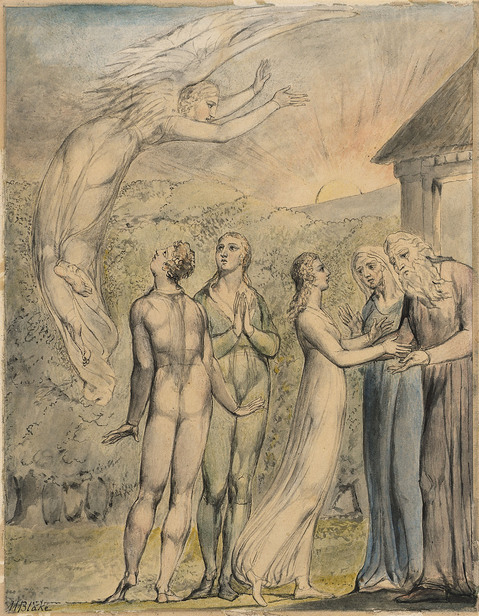 |
| Wikimedia Commons Milton's Comus Butts Set, Illustration 8 |
There is a tension in Christianity between the way of affirmation and the way of renunciation. The former leads toward living in the world fully and learning through involvement; the latter requires turning inward and renouncing the world and its troubles to be filled with spirit alone. We can see something of this dichotomy in the turning of the Lady toward the material world and the brothers turning toward the world of spirit represented by the attendant Spirit.
Milton wrote on the two ways to direct ones attention when he wore L'Allegro and Il Penseroso. He did not however imply that the outer and inner pursuits were alternate ways of pursuing the spiritual journey.
A Mask Presented at Ludlow Castle, 1634
John Milton
Line 976
Spirit
"To the Ocean now I fly,
And those happy climes that ly
Where day never shuts his eye,
Up in the broad fields of the sky:
There I suck the liquid ayr
All amidst the Gardens fair
Of Hesperus, and his daughters three
That sing about the golden tree:"
Line 1012Spirit
"To the Ocean now I fly,
And those happy climes that ly
Where day never shuts his eye,
Up in the broad fields of the sky:
There I suck the liquid ayr
All amidst the Gardens fair
Of Hesperus, and his daughters three
That sing about the golden tree:"
"But now my task is smoothly don,
I can fly, or I can run
Quickly to the green earths end,
Where the bow'd welkin slow doth bend,
And from thence can soar as soon
To the corners of the Moon.
Mortals that would follow me,
Love vertue, she alone is free,
She can teach ye how to clime
Higher then the Spheary chime;
Or if Vertue feeble were,
Heav'n it self would stoop to her.
The End"
Bette Charlene Werner, commenting on the final illustration of Comus in Blake's Vision of the Poetry of Milton: Illustrations to Six Poems, makes this statement:
"Blake insists on the psychological dimensions of the action by removing the embellishments of public ceremony and picturing simply a small private step toward maturity. The quiet tone accords with the artist's perception of the meaning of the action: "travellers to Eternity, pass inward to Golgonooza." In the homecoming of the Lady in Comus Blake sees the pattern of inward-turning that brings to a close Milton's other depiction of temptation overcome, Christ's temptation in the wilderness in Paradise Regained. The quiet reception of the Lady her family matches the scene for Christ's homecoming, when 'he unobserv'd / Home to his Mother's house private return'd.' In altering Milton's scene of communal rejoicing to a picture of private homecoming, Blake concentrates attention on the personal and inward dimensions of Lady's acceptance of her human lot.
...
While Milton placed concluding emphasis on the spirit's words that recommend leaving this world, Blake closes the sequence of his illustrations by showing the Lady's acceptance of it. Blake's design provides a personal, corrective reading of the meaning of Milton's myth. He suggests by the uncertain expressions and gestures of the participants that the poet who celebrated their trials and their return may have himself failed to realize their true significance." (Page 36)
Blake's poem Milton is an account of the spiritual journey undertaken by Milton, by Blake and by the reader to remove the impediments to recovering the ability to perceive reality as it is: infinite. Blake's final picture of the Comus series is an invitation to begin consciously the journey.
Milton, Plate 14 [15], (E 108)
"Then Milton rose up from the heavens of Albion ardorous!
The whole Assembly wept prophetic, seeing in Miltons face
And in his lineaments divine the shades of Death & Ulro
He took off the robe of the promise, & ungirded himself from the oath of God
And Milton said, I go to Eternal Death!"
Milton, Plate 40 [46], (E 142)
"The Negation must be destroyd to redeem the Contraries
The Negation is the Spectre; the Reasoning Power in Man
This is a false Body: an Incrustation over my Immortal
Spirit; a Selfhood, which must be put off & annihilated alway
To cleanse the Face of my Spirit by Self-examination.
Plate 41 [48]
To bathe in the Waters of Life; to wash off the Not Human
I come in Self-annihilation & the grandeur of Inspiration
To cast off Rational Demonstration by Faith in the Saviour
To cast off the rotten rags of Memory by Inspiration
To cast off Bacon, Locke & Newton from Albions covering
To take off his filthy garments, & clothe him with Imagination
To cast aside from Poetry, all that is not Inspiration"

No comments:
Post a Comment